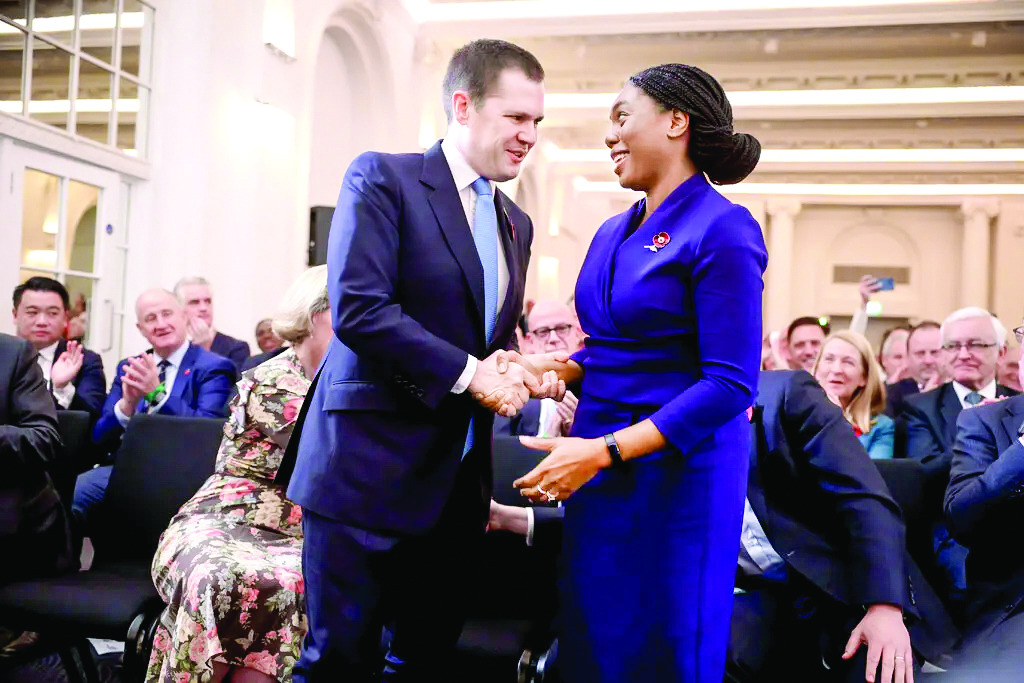Badenoch was elected for her persuasive personality and not policy. Throughout her whole campaign there was more obsession about her Nigerian race than what she stands for.
London: The Conservative and Unionist Party has a new Leader, the original favourite Kemi Badenoch was elected by 53,806 Conservative member votes, her competitor Robert Jenrick received 41,388 and 655 ballots were spoilt. The Tory membership eligible to vote was 131,680 and turn-out was expectedly low only at 72.8%. Evidently Badenoch had a clear majority, however just over a quarter of members did not note, and it is notable how small the Tory membership is, compared to in the early 1950’s during Churchill’s time when the party had a membership of 2.8 million.
Badenoch was elected on her persuasive personality and not policy, throughout her whole campaign there was more obsession about her Nigerian race than what she stands for. Lord William Hague commented it was clever of her not to commit to policies as it allowed so much room to manoeuvre and not be held to account for promises made during her campaign; a lesson that Keir Starmer’s government is learning at the moment.
Badenoch has formed her new Shadow Cabinet giving three of her competitors Shadow roles, Priti Patel as Shadow Foreign Secretary, Robert Jenrick as Shadow Justice Secretary, Mel Stride as Chancellor; the rest comprise of some Rishi Sunak holdovers such as Clare Cotinho and Victoria Atkins, and some relatively new but early backer MPs. It has been reported but unconfirmed that Jeremy Hunt, James Cleverly and Tom Tugendhat declined Shadow Cabinet roles.
Badenoch’s joined the Conservative party aged 25. Her campaign mantra was “Renewal 2030”, not to be confused with the “Great Reset Agenda 2030” a post-pandemic project conceived by King Charles III and the WEF, joined by the IMF for a greener, smarter, fairer revolution to capitalism. Badenoch says 2030 is the first full year of a government after the next general election, and she intends to lead that government. Badenoch’s 36 page pamphlet “Renewal 2030” gives a good insight into her thinking, this is her recurring theme “In nearly every country, a new progressive ideology is on the rise. This ideology is based on the twin pillars of constant intervention on behalf of protecting marginalised, vulnerable groups, including protecting us from
It is these candid views that earn her the reputation of “feisty” and “anti-woke”, and give the press their culture wars headlines. Badenoch is a believer in free-speech and the Labour Party will be mining her past opinions to hold against her.
Badenoch eschews “identity politics” but the label “first black woman” chases her, even her ardent supporter Michael Gove, now editor of the Spectator Magazine identifies her as such. Badenoch has been an MP since 2017, she has held various roles in both the Johnson and Sunak governments. Along with four others she jointly-resigned as Equalities Minister from the Johnson Government without naming the reason, thought to be over Johnson’s mishandling about allegations of sexual misconduct by the former deputy Chief Whip. These five resignations played a part in bringing down PM Johnson; three of these co-signatories are in the Shadow Cabinet, the fourth lost his seat. Badenoch backed Gove in the subsequent leadership context in 2016.
Badenoch is a hawk on illegal immigration and support for Israel, and as Secretary for Business and Trade she signed a first-of-its-kind trade and investment partnership with Nigeria; then upgraded the FTA with Turkey; opened negotiations with the GCC and signed a declaration of intent with the Kingdom of Saudi Arabia, solidifying commitment to jointly develop resilient and responsible critical minerals supply chain. She was in India before the G20 and it was hoped the now infamous UK-India FTA would be concluded, which has reportedly stalled due to an impasse of temporary business visas and student visas despite India’s favourable tariffs on cars and whisky.
Badenoch’s task is to unite the party so it operates as a team, and to rebuild the trust of conservative voters in the Conservative Party/persuade them to return from The ReformUK Party. Bob Blackman Chair of the 1922 Committee has chosen this moment to change the rules around votes of no confidence. Formerly a challenge required 15% of MPs but now there are only 121 Tory MPs a challenge requires 33.3% which is 40 MPs.
Being in opposition is a contrast to being part of a government in power, as witnessed in Badenoch’s PMQ’s debut, during the initial questions it seemed as if she was currying favour with the faithful directing cheap shots at Keir Starmer about Trump’s victory; followed by more serious questions about the lack of any defence spending in the Reeves Budget and Labour’s new taxing of farmers that is likely to have a detrimental impact on the future of farming.
As Michael Gove has said Badenoch has a pulpit and her challenge is to deal with the disaffection with the political debating structure, she needs to define herself afresh and that will depend on where she is seen, the issues she raises, and the people she puts forward.

